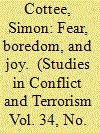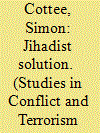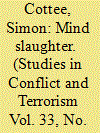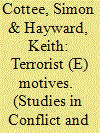|
|
|
Sort Order |
|
|
|
Items / Page
|
|
|
|
|
|
|
| Srl | Item |
| 1 |
ID:
165040


|
|
|
|
|
| Summary/Abstract |
Trinidad and Tobago (T&T), a small twin-island republic in the Caribbean, has one of the highest rates of foreign fighter radicalization in the western hemisphere. According to official estimates, around 130 Trinidadian nationals migrated to ISIS-controlled territory in Syria and Iraq between 2013 and 2016. This article seeks to make sense of these migrations, placing them in the broader historical and social context in which they occurred. Drawing on a range of quantitative and qualitative primary source material, the article finds, contrary to expectation, that the archetypal adult ISIS traveller from T&T is not a marginalized, youthful and mostly male city dweller who radicalized outside of a mosque, but is in fact as likely to be female, in his or her mid-30s, married, have children, attend a mosque, live in a rural area, and have suffered neither the pains of economic hardship nor the ill effects of marginalization from the wider society because of his or her Muslim identity. As well as emphasizing the intersection between the local and the global in jihadist foreign traveller mobilization, the article also demonstrates the importance of personal connections in the migrations of Trinidadians to Syria and Iraq, lending further support to research on the centrality of social networks in facilitating radicalization and foreign fighter mobilization.
|
|
|
|
|
|
|
|
|
|
|
|
|
|
|
|
| 2 |
ID:
106587


|
|
|
|
|
| Publication |
2011.
|
| Summary/Abstract |
This review article explores the emotional attractions of war and military combat. Using Sebastian Junger's recently published book War as a central point of reference, it elucidates and supports the idea that, for combatants, war is often experienced as a profoundly exciting and existentially rewarding human activity. By bringing into focus and helping to conceptualize the raw appeal of combat, Junger's account of war can be enlisted as a resource for understanding the positive emotional drives behind acts of terrorism.
|
|
|
|
|
|
|
|
|
|
|
|
|
|
|
|
| 3 |
ID:
179837


|
|
|
|
|
| Summary/Abstract |
This article provides a framework for thinking about incels and incel-inspired terrorism. Incels are part of a fringe online subculture that trades in misogyny, victimhood and fatalism. The aim of the article is to describe these aforementioned orientations and the emotions associated with them. Only a tiny minority of incels commit acts of incel-inspired terrorism. Research on shame and revenge provides a useful starting-point for understanding these acts.
|
|
|
|
|
|
|
|
|
|
|
|
|
|
|
|
| 4 |
ID:
109141


|
|
|
|
|
| Publication |
2011.
|
| Summary/Abstract |
My aim in this article is to extend Marc Sageman's seminal research on Al Qaeda by re-articulating it through the prism of Albert Cohen's theory of delinquent subcultures, an approach which came to prominence in Criminology in the 1960s, but has since then been largely eclipsed by other approaches in that field. Drawing on Sageman's findings and observations, I suggest that Al Qaeda-affiliated or -inspired groups in the West can be best understood as a collective response or "solution" to the strains encountered by the members of these groups, and that these strains are imposed on them by the circumstances in which they find themselves. My broader aim is to show that although Criminology, with a few exceptions, ignores the subject of terrorism, terrorism studies can appreciably benefit from an engagement with Criminology as a source of theoretical inspiration.
|
|
|
|
|
|
|
|
|
|
|
|
|
|
|
|
| 5 |
ID:
093018


|
|
|
|
|
| Publication |
2009.
|
| Summary/Abstract |
On one night in October 2007, at an event organized by The New Yorker and chaired by Bill Buford, Martin Amis and Ian Buruma convened to discuss the theme of the monster in politics and literature.
|
|
|
|
|
|
|
|
|
|
|
|
|
|
|
|
| 6 |
ID:
095228


|
|
|
|
|
| Publication |
2010.
|
| Summary/Abstract |
This article focuses on the neutralizations of the jihadi Salafi ideology. It is divided into three parts. The first describes the various rhetorical accounts that ordinary people use to neutralize conventional moral controls against inhumane conduct. The second traces how these accounts inform and drive the jihadi Salafi worldview. The third, and concluding, part of the article sketches out the policy implications of the analysis set out here, arguing that any attempt to derail the global Salafi jihad must critically undermine the core neutralizations of the jihadi Salafi ideology, since it is these which enable jihadi combatants to escape conventional moral constraints and perpetrate acts of inhumanity.
|
|
|
|
|
|
|
|
|
|
|
|
|
|
|
|
| 7 |
ID:
109150


|
|
|
|
|
| Publication |
2011.
|
| Summary/Abstract |
This article describes a number of possible existential motivations for engaging in terrorism. Three in particular are identified: (1) the desire for excitement, (2) the desire for ultimate meaning, and (3) the desire for glory. Terrorism, according to the argument set out here, is as much a site of individual self-drama and self-reinvention as a tactical instrument for pursuing the political goals of small groups. The conclusion explores the concept of "existential frustration," and suggests that terrorist activity may provide an outlet for basic existential desires that cannot find expression through legitimate channels.
|
|
|
|
|
|
|
|
|
|
|
|
|
|
|
|
| 8 |
ID:
172499


|
|
|
|
|
| Summary/Abstract |
Research on jihadist online propaganda (JOP) tends to focus on the production, content, and dissemination of jihadist online messages. Correspondingly, the target of JOP—that is, the audience—has thus far attracted little scholarly attention. This article seeks to redress this neglect by focusing on how audiences respond to jihadist online messaging. It presents the findings of an online pilot survey testing audience responses to clips from English-language Islamic State of Iraq and Syria videos. The survey was beset at every stage by ethical, legal, and practical restrictions, and we discuss how these compromised our results and what this means for those attempting to do research in this highly sensitive area.
|
|
|
|
|
|
|
|
|
|
|
|
|
|
|
|
| 9 |
ID:
154360


|
|
|
|
|
| Summary/Abstract |
In his influential and provocative article on “What ISIS Really Wants,” published in The Atlantic in March 2015, Graeme Wood argued that “the Islamic state is Islamic. Very Islamic.” He also sought to challenge what he diagnosed as a “western bias” among academics and policymakers toward religious ideology, whereby religious doctrines or beliefs are relegated to the status of epiphenomena rather than taken seriously as causal properties in their own right. Wood's article sparked a wider—and still ongoing—debate over the relationship between Islam and jihadist violence. For one side in this debate, Islamic State of Iraq and Syria (ISIS) is inexplicable without reference to Islamic scripture; indeed, some commentators and politicians have even argued that it represents the “true” face of Islam; for the other side, ISIS is a hideous distortion of Islam's “true” teachings, and is inexplicable without reference to the wider political circumstances in which it emerged and to which it is a response. This article attempts to forge a middle way between these two polarized viewpoints by arguing that any comprehensive account of ISIS must recognize both its secular and theological bases. More specifically, and drawing on the work of the intellectual historian Quentin Skinner, it argues that Wood's critics, in their understandable but misplaced eagerness to detach Islam from jihadist violence, fail to accord proper causal weight to the legitimizing role of revolutionary Islamic ideas—and the innovating ideologists who develop these—in the commission of this violence.
|
|
|
|
|
|
|
|
|
|
|
|
|
|
|
|
|
|
|
|
|